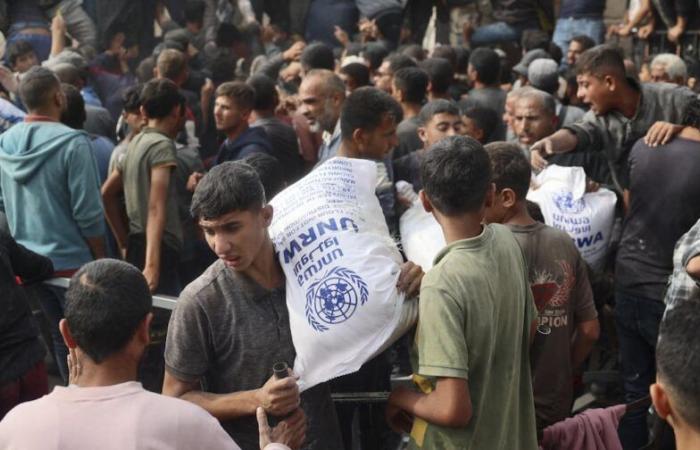Israel has just banned UNRWA from operating in the occupied Palestinian territories, accusing it of having been massively infiltrated by Hamas. However, the UN agency provides many essential services to the inhabitants of the West Bank and especially Gaza: the cessation of its activities will considerably worsen their already disastrous situation.
On November 4, 2024, Israel officially informed the UN of its intention to sever ties with UNRWA, the UN agency responsible for Palestinian refugees in the Middle East. A decision reinforced the next day by the victory in the American presidential election of Donald Trump, constant support of Benjamin Netanyahu and virulent detractor of the UN agency.
This is the first step in the application of two controversial laws passed on October 28 by the Knesset – the Israeli Parliament – banning UNRWA activities in East Jerusalem, the West Bank and the Gaza Strip. Three territories where Israel, as the occupying power, is nevertheless required to guarantee access to humanitarian aid under the Geneva Conventions of 1949.
The first law prohibits actions carried out by the agency on Israeli territories, including East Jerusalem which was annexed in violation of international law. While the second text makes any contact between Israeli state authorities and the agency illegal, which would prevent any coordination between UNRWA and the Israeli military administration which controls the occupied territories.
The end of the operations of the UN agency, which is very active in Gaza, particularly in terms of vaccinations against poliomyelitis (polio) and coordination of aid arriving in dribs and drabs, would have dramatic consequences. Especially in this besieged enclave where the health and humanitarian situation, after 13 months of conflict, is described as “catastrophic” by the World Health Organization. Remember that from January 2024, an order from the International Court of Justice (ICJ) mentioned in this regard the “risk of genocide”.
The desire to dismantle UNRWA is not new. The October 28 decision marks the culmination of a process launched by Tel Aviv years ago to get rid of this agency which, in its 75 years of existence, has never ceased to remind Israel of its responsibilities in creation of the refugee problem as well as violations of international law linked to its expansionist policy.
Essential humanitarian interventions and political role
UNRWA was established in 1949 to provide emergency assistance to nearly 800,000 Palestinian refugees. Its initial mandate aims to improve their living conditions, until a just settlement of their situation, based on resolution 194 (III) passed on December 11, 1948 which establishes their right to return and compensation. Subject to a three-year renewal, this mandate has been perpetuated due to the non-resolution of the problem.
In its five areas of intervention (Jordan, Lebanon, Syria, Gaza and the West Bank), UNRWA has become, for some 6 million people, a major provider of essential services (education, health, housing). It maintains the infrastructure of 58 camps where it manages 706 schools welcoming half a million students, 140 basic medical dispensaries and 113 community centers, and also supports 475 microfinance projects.
UNRWA is also, after the public services of the host countries, the largest employer in the region with nearly 30,000 employees, the majority of whom are Palestinians. It also has millions of archival documents (in Gaza and Amman) which constitute an exceptional historical source, particularly on the question of refugees.
If at the time of its creation, the action of the agency had been conceived as neutral and apolitical, it inevitably became politicized.
Finding a political solution to end the Israeli-Palestinian conflict was the responsibility of the United Nations Conciliation Commission for Palestine (UNCCP), which completed its work in the late 1950s. Since then, UNRWA has become the only body of the UN providing the Palestinians with quasi-state services, but it does not grant them international political protection. Indeed, Palestinians are excluded from the protection system established by the Geneva Convention relating to the Status of Refugees of 1951.
The political character of UNRWA is due to the fact that it materializes the responsibility of the international community towards Palestinian refugees, who consider it as the guarantor of their right of return. Theoretically, his mandate could have ended with a political resolution, such as that expected from the 1993 Oslo Accords.
After the failure of the Oslo process, a return to international law?
During the period of negotiations opened by the Declaration of Principles on Interim Autonomy Arrangements (Oslo I), several thorny issues – including that of Palestinian refugees – were postponed to the so-called “final status” phase, ostensibly in order to avoid not compromise all discussions.
For the Palestinians, the horizon of expectation opened up by this issue did not only concern the return of refugees, but also the creation of a Palestinian state alongside an Israeli state within the borders of 1967. After the creation of such a state, the Palestinian Authority (PA) would have taken over UNRWA's responsibilities in the Gaza Strip and the West Bank. A service transfer plan was thus provided for by the “Peace Implementation Program” in order to improve living conditions in the refugee camps and ensure the economic development of the Palestinian territories.
However, the failure of the Oslo process (largely resulting from Israel's continued illegal colonization of the Palestinian territories) results in the return of the pre-eminence of the legal framework established by UN resolutions, as recently recalled the International Court of Justice (ICJ) in one of its decisions.
According to the latter, international law takes precedence over negotiations including those in Oslo, and the Israeli occupation of the territories occupied in 1967, declared illegal, must end within 12 months following the resolution of September 18, 2024 of the General Assembly of the United Nations.
UNRWA therefore constitutes, by its simple existence and its constant action, a permanent reminder of international law with which Israel should comply. So its elimination would allow Tel Aviv to put at bay the problem of the right of return of refugees, absolutely taboo on the Israeli side.
However, the socio-economic and political consequences that would result from the disappearance of the UN agency are particularly worrying.
What are the post-UNRWA perspectives?
Following the occupation of the Palestinian territories in 1967, Israel requested UNRWA to continue its services which it undertook to facilitate in accordance with an exchange of letters dated June 14, 1967.
Relations between Israel and the agency then deteriorated from the 1970s. Tel Aviv accused UNRWA of participating in the ideological radicalization of Palestinians through its schools and of being an arena of action for actors of the Palestinian National Movement.
Tensions worsened after the October 7, 2023 attacks by Hamas, after which 19 of the 13,000 UNRWA employees in Gaza were accused by Israel of having participated in the attacks. In reaction and without waiting for a [enquête] is launched, the United States and several countries of the European Union, including Germany, France and Italy, suspended the payment of their funding to the agency in January 2024. After an investigation by former French Foreign Minister Catherine Colonna, only the United States and Switzerland continued to freeze the funds.
Over the past 13 months, UNRWA offices in Gaza have been targeted by Israeli strikes, to the detriment of international humanitarian law: 190 schools, health and distribution centers have been bombed, and 563 displaced people sheltered in its schools as well. that 226 agency employees were killed.
Refugee camps in the Gaza Strip and West Bank have been targeted by multiple attacks. Last May, UNRWA headquarters in East Jerusalem was forced to close after an attempted fire. In October, land in the Sheikh Jarrah neighborhood where the headquarters is located was confiscated, as part of the expansion of an Israeli settlement.
In continuation of these attacks, the latest laws adopted by the Knesset to prohibit the actions of UNRWA violate international law, without offering an alternative to help Palestinian refugees. Israel simply asserts that it hopes that other “non-politicized and more effective” UN agencies and international organizations will take over.
Tel-Aviv also recommends the intervention of private organizations, which do not conform to the principles of neutrality and independence, within the framework of “humanitarian bubbles” managed by private companies or “gated communities” which in reality are similar to , to internment camps.
Read more:
Israel’s ban on UNRWA continues a pattern of politicizing Palestinian refugee aid – and puts millions of lives at risk
In recent months, the speeches of many Western governments on Palestinian refugees have only reinforced the exclusively humanitarian attribution of the political problems which characterize their situation.
While the “humanitarian crisis” has become a consensual expression to describe the catastrophic situation plaguing the Gaza Strip, the two laws passed by the Knesset aim to eradicate the main actor capable of taking charge of the humanitarian response.
After the marginalization of the political question of the rights of Palestinian refugees, we are therefore observing a planned deterioration of their living conditions with a risk, ultimately, of annihilating their very existence.






